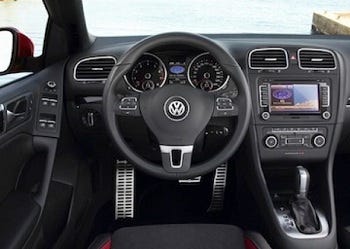By creating the instrument panel structure for the new VW Golf 7 using microcellular foam, Volkswagen engineers have succeeded in reducing its weight by 500g, or more than 1 lb, versus the prior model of the Golf.Instrument panel structure is lighter, and molded in faster cycle time, using Trexel's MuCell process.
March 27, 2012
By creating the instrument panel structure for the new VW Golf 7 using microcellular foam, Volkswagen engineers have succeeded in reducing its weight by 500g, or more than 1 lb, versus the prior model of the Golf.
|
Instrument panel structure is lighter, and molded in faster cycle time, using Trexel's MuCell process. |
Roger Hillert, head of the Polymer Group at Volkswagen AG, said, "Appearance, light-weighting and cost are the biggest challenges in automotive cockpits today. Foaming has significant advantages for us. By using the MuCell process, we are saving material and using lower processing temperatures, with the result of a reduced cycle time. The finished part has less inert stress, and improved dimensional stability," he said.
The MuCell Microcellular Foam technology from Trexel Inc. (Wilmington, MA) is a complete process and equipment technology that enables the production of plastic parts with significantly enhanced dimensional stability, lower weight/material and reduced cycle time. MuCell technology involves the introduction of precisely metered quantities of atmospheric gases (nitrogen or carbon dioxide) in the plasticizing unit of an injection molding machine to create a microcellular material structure in the end product.
Weight savings of a little more than one pound are significant, as plastic parts are an area where it is particularly challenging to save weight without sacrificing strength, durability or function. The VW Golf 7 is the second vehicle employing an instrument panel using the MuCell process, joining the Ford Escape/Kuga IP, which recently went into production.
"The instrument panel on the former model of the Golf weighed 3 kg," said Steve Braig, president and CEO of Trexel, "and the 500g taken out of the weight of the new Golf 7 instrument panel is just a start toward even more significant weight reductions to come as VW engineers begin to fully realize the weight-reduction and design-freedom advantages of the MuCell process," he added. "In addition, our customers typically report that lower processing temperatures are used, with the result that molding cycle-time reductions of up to 20% are typical."
"Volkswagen is a strategic user of the MuCell process and we have several MuCell automotive applications in production with them. This application is the most complex," said Braig. "The new Golf 7 is a global platform, and is destined to be one of the world's highest-volume vehicles to be produced during its model run."-[email protected]
About the Author(s)
You May Also Like



